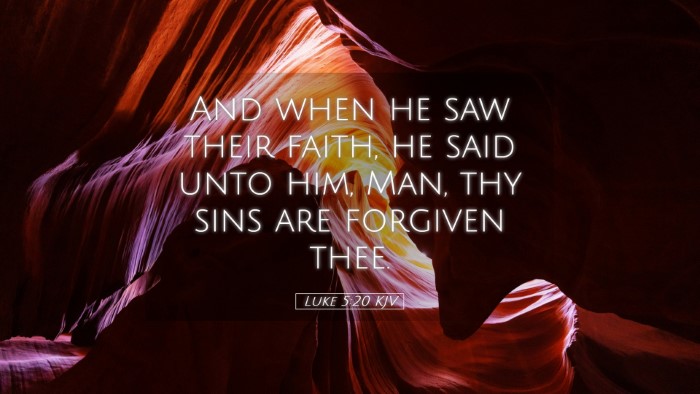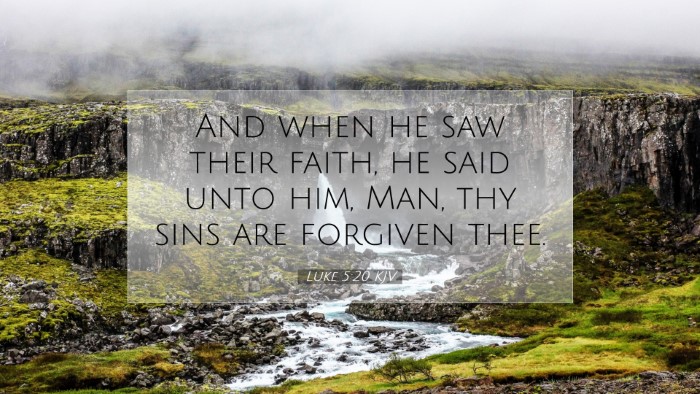Commentary on Luke 5:20
Luke 5:20 states: "And when he saw their faith, he said unto him, Man, thy sins are forgiven thee." This verse captures a significant moment in the ministry of Jesus, highlighting themes of faith, healing, and forgiveness. The context of this passage, along with the insights from renowned public domain commentaries, reveals profound theological implications worthy of exploration.
Contextual Setting
In Luke 5, Jesus is in Capernaum, surrounded by a multitude. The verse follows the remarkable story of Jesus healing a paralyzed man lowered through the roof by his friends. This act of faith serves as a backdrop for understanding the depth of Jesus’ response found in verse 20.
Insights from Public Domain Commentaries
Matthew Henry's Commentary
Matthew Henry emphasizes that the faith of the friends was instrumental in the healing and forgiveness of the paralyzed man. He notes, "Their faith was strongly exercised; they believed that Christ could save him, and they brought him to Him." This perspective encourages pastors and theologians to consider the communal aspect of faith, where one person’s faith can affect another’s healing and reconciliation with God.
The Nature of Faith
Henry further elaborates on faith, stating that true faith is visible in action. As the friends lowered the man through the roof, it demonstrated a determination and trust in Jesus’ ability to heal. He comments, "Christ takes notice of their faith, not only in His power to heal but to forgive." This brings to light the idea that physical ailments can be intertwined with spiritual conditions, and Jesus addresses both in His ministry.
Albert Barnes' Notes on the Bible
Albert Barnes provides an analytical view, focusing on the significance of Jesus declaring forgiveness. He writes, "The first claim Jesus makes is on the spiritual state of the man, illustrating that the essence of His mission is about reconciliation with God." This theological point places the emphasis on the priority of spiritual needs over physical ones, a common theme in Jesus' teachings.
Forgiveness vs. Healing
Barnes also discusses how the forgiveness of sins is paramount to the healing of the body. He notes, "Christ's declaration is a direct challenge to the religious leaders, affirming His divine authority to forgive sins." This assertion that only God can forgive sins is crucial as it underscores Christ's divine nature and mission, offering a rich foundation for theological discussions on Christology.
Adam Clarke's Commentary
Adam Clarke adds a rich historical and cultural context to the verse, emphasizing the power of intercessory faith. He mentions that the actions of the friends are "a representation of the Church's role in bringing sinners to Christ." This perspective can inspire church leaders today to foster environments where collective faith brings about healing and salvation.
Intercessory Prayer
Clarke elaborates on the mechanism of intercessory prayer and its effectiveness, stating, "The man's healing was instituted by the faith of those who brought him, indicating the power of mutual support in the community of believers." This calls attention to the significant role that the Church plays in the process of salvation and healing, prompting discussions about outreach and community support.
Theological Implications
This commentary reveals several theological implications central to Christian teaching:
- The Authority of Christ: Jesus' declaration of forgiveness demonstrates His authority as the Son of God, reaffirming His role as the mediator between God and humanity.
- The Nature of Faith: The faith exhibited by the paralyzed man's friends illustrates collective faith’s ability to bring about healing, a theme that resonates throughout Scripture.
- Holistic Salvation: Jesus addresses both physical and spiritual needs, emphasizing that true healing involves reconciliation with God as well as physical restoration.
- Community and Intercession: The role of the community in bringing individuals to Christ highlights the importance of communal faith and support in spiritual matters.
Practical Applications
For pastors and theologians, the depth of Luke 5:20 offers practical applications:
- Encouragement for Faith: Encourage congregants to exhibit a faith that actively seeks Christ, demonstrating determination in prayer and support for others.
- Focus on Forgiveness: Regularly emphasize the importance of forgiveness, both receiving and extending it, within the life of the Church.
- Community Outreach: Foster a culture of intercession and community support, ensuring that the church acts as a conduit for bringing the lost to Christ.
- Preaching Holistic Salvation: Adopt a balanced theological approach that acknowledges Jesus’ ministry of healing as connected to His mission of redemption.
Conclusion
Luke 5:20 presents a profound encounter between Jesus and a paralyzed man, emphasizing the power of faith and the essential nature of forgiveness. Drawing insights from Matthew Henry, Albert Barnes, and Adam Clarke provides a multifaceted understanding of this passage, highlighting its importance for contemporary faith practice. As we delve deeper into Scripture, may we always seek to understand not only the words of Christ but also the transformative power they hold for our lives and ministries.


